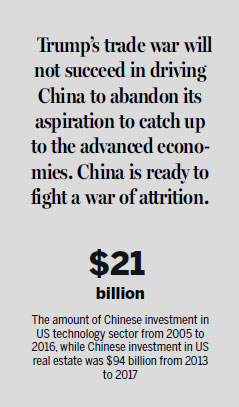Trump's IP theft case weak
US President Donald Trump's administration has based its decision to impose trade tariffs on China, and risk a broadly catastrophic trade war, on a report that does not stand up to scrutiny. The decision, it seems clear, was made before the report was even written.
No one wins in a trade war. Yet Trump seems determined to pursue one with China, which he accuses of causing the United States' trade deficit, violating World Trade Organization rules, and using unfair practices to acquire foreign technology. While most economists marvel at Trump's ignorance of how trade balances work, many broadly agree with his charges regarding intellectual property. But the evidence supporting these charges is also weak, at best.

The so-called Section 301 trade investigation launched by Trump's administration last year accused China of acquiring foreign technologies using discriminatory licensing restrictions, unfair technology-transfer agreements, targeted outbound investment, unauthorized intrusions into US commercial computer networks, and cyber-enabled IP theft. "The weight of the evidence", the report concludes, shows that China uses foreign-ownership restrictions to force US companies to provide their technologies to Chinese entities.















